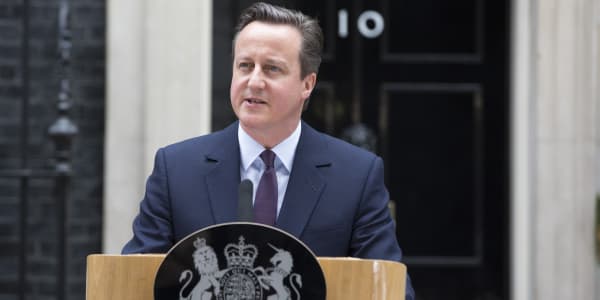The Conservatives' surprise victory in the U.K. elections was won on the back of a number of promises that may come back to haunt them.
At least they didn't get them carved in stone (yes, really), like woebegone former Labour Party leader Ed Miliband. Yet some of the center-right Conservative party's promises will be difficult to keep—and here we look at why.
Bye-bye deficit
The relaxation of austerity in the run-up to the election has reduced the rate of deficit reduction already—and an increasing number of economists believe that the government will struggle to hit its target of eliminating the deficit by the next election, in 2020.
Read MoreHas Krugman been proved wrong on austerity?
"They will be unable to deliver serious austerity until 2017 at the very earliest, and by then they will be starting to think about the next election," Holger Schmieding, chief economist at Berenberg, the German bank, told CNBC.
"It will be very politically difficult to implement big cuts."
Migrant benefits
One of the U.K.'s biggest battles with the European Union is over whether economic migrants to the country should be able to claim welfare money like child benefit or tax credits.
Free movement of people is a cornerstone of the 28-country union and noises from the rest of the EU about U.K. concerns aren't exactly encouraging. Wolfgang Schaeuble, the irascible German finance minister, decisively dampened British hopes for a quick resolution to the benefits and other issues on Tuesday, in comments to reporters on the margins of an EU regular meeting.
"The realistic assessment of the German government is that it is not at all certain that this can be achieved quickly," he said, according to the Financial Times newspaper.
The North remembers…
…all the pledges to build a "Northern powerhouse" in the North of England and all the photocalls of Chancellor of the Exchequer George Osborne (the only member of the Cabinet whose constituency seat is in the North) wearing hardhats and visiting building sites. Will the Conservatives be able to transform this historically underperforming region?
Plans include a new high-speed rail link between the northerly cities of Leeds and Manchester. Yet IPPR North, the economic think tank, believes there is still a gap in planned infrastructure investment between the North and South of England of nearly £2,000 ($3,134) per person. And some parts of the region with higher-than-average numbers of benefits claimants will be hit hard by planned cuts to welfare.
Human Rights hangover
Repealing the Human Rights Act in favor of a "British Bill of Rights" is one of the cornerstones of the Conservative manifesto, yet may create more problems than it solves. It would also put the U.K. in company with isolated Belarus as the only European countries not to comply with the European Court of Human Rights.
The reason the Conservatives are so opposed to the Human Rights Act is that in certain high-profile cases it has made it harder to deport foreign-born criminals.
Read MoreUK results 'supportive' for stocks
However, lawyers, lobby groups and opposition politicians are already warning that repealing the Act may violate several vital U.K. treaties, including the Good Friday Agreement that brought peace to Northern Ireland and legislation over devolving powers to Scotland. With the Scottish National Party (SNP), who won almost every seat north of the border in last Thursday's election, unlikely to accept change, the Conservatives will have a fight on their hands.






